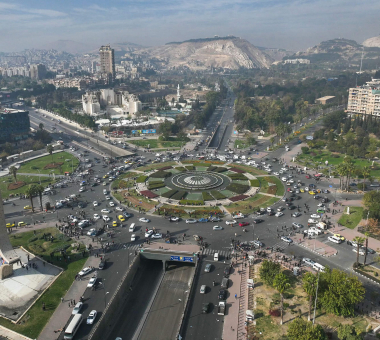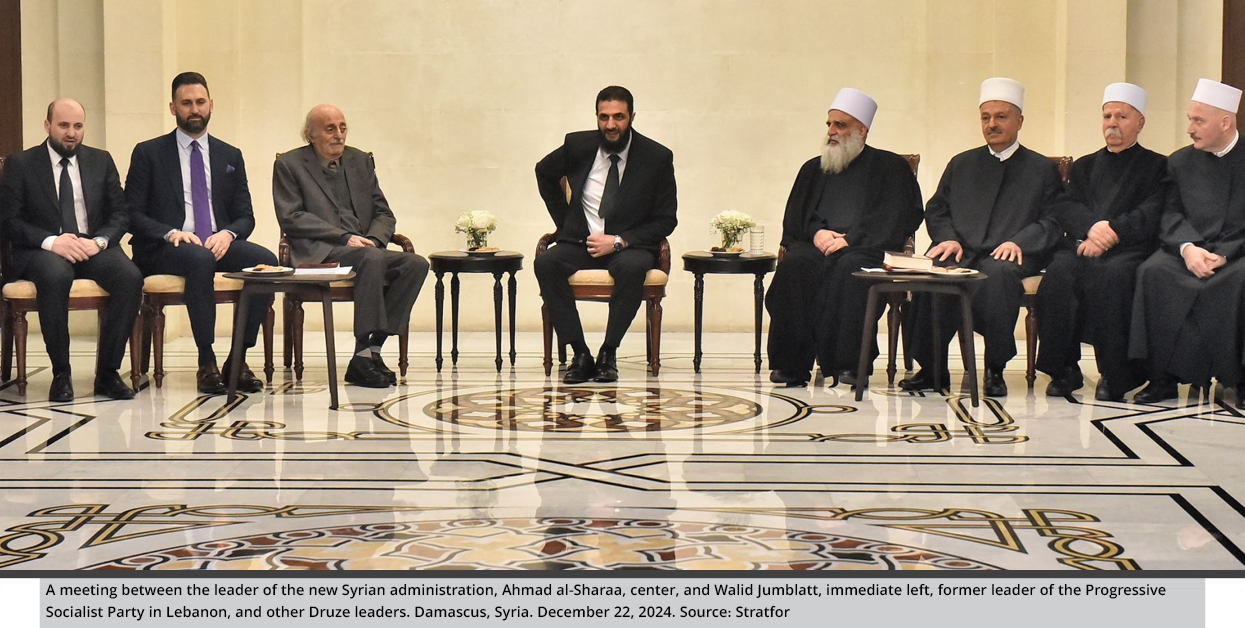So That All Is a “Majority” in Syria
The issue of “minorities” remains a prominent concern in Arab politics. It is a central part of discussions surrounding democracy and human rights in the Arab world, as well as the construction of a unified national identity and the civil state based upon it. Moreover, the topic of minorities is not new to Arab politics or political literature, but it vanishes and reappears depending on the different historical and political contexts that have shaped our region since the advent of modern political thought and action.
by Hasan Ismaik
- Release Date – Jan 12, 2025

The topic of minorities is not new to Arab politics or political literature, but it vanishes and reappears depending on the different historical and political contexts that have shaped our region since the advent of modern political thought and action. With the rise of Arab nationalism at the end of the 19th century and the beginning of 20th century, a debate on minorities began to emerge in the context of the challenges faced by Arabs under the Ottman rule and the colonialism that followed it. This discussion occurred within the framework of attempts to promote an Arab identity that included all groups of religious and ethnic minorities.
Some influential thinkers of that time, such as Abd al-Rahman al-Kawakibi and Jurji Zaydan, addressed the topic of national and Arab identity comprehensively, stressing the importance of unity between Muslims and Christians as a part of the national project. Later, the civil discussion widened to address the issue of minorities within a wider context related to social justice and political participation
Of course, the issue of minorities still persists today in Arab politics, as it is a key part of the current debates on democracy and human rights in the Arab world, as well as the construction of national identities and civil states that embrace democracy and human rights. Therefore, this discussion is not limited to the Arab countries alone. In fact, the issue of minorities, diversity, and public rights is alive even in the developed societies that tout themselves as an example of respect for minorities and marginalized individuals within their territories.
There are still a lot of questions marks on the nature of this respect. Is it sincere or just for show? Is it only related to winning elections or does it actually guarantee these groups their rights beyond the time of the electoral campaigns? Is it imposed freely and equally, carried out by the majority of its own will and as a result of knowledge, awareness, and intellectual development? And, lastly, will it continue even if the legal motives or the social and international norms of “political correctness” imposed by it cease to exist?
The depth of this problem appears more clearly in the absence of a comprehensive and agreed-upon definition of which group can be described as a minority. Despite the frequent circulation of the term “minority” in political statements, international resolutions, and human rights laws, and even in media discussion and debates, the concept expressed by the term is still controversial and subject to the views of researchers and scholars, as well as the different standards of politicians and jurists. Hence, we find different definitions of the term minority, most of which adopt the simplest criterion, such as the number of members of a particular group. But things are complicated when the number variable is linked to other variables, such as religion, language, race, ethnicity, or other affiliations that may affect whether the group classifies as a minority or not.

A minority is typically defined as a group of individuals who differ from the dominant majority in society in terms of religion, language, race, or culture. This group shares common characteristics that foster a sense of belonging and distinct identity that separates them from the wider society. However, does a numerical difference alone qualify a group as a minority? The answer is an unequivocal no.
A minority is not necessarily the smaller group in terms of numbers. For instance, during the era of apartheid in South Africa, from the 1940s to the early 1990s, the so-called minority group—Black people—was significantly larger than the group of white people who held the majority of power and were, therefore, the majority group. This example illustrates that the designation of a group as a minority primarily hinges on power dynamics and control. The dominant group constitutes the majority, while all other groups are considered minorities, regardless of their numerical size.
In this context, the “Encyclopaedia of the Social Sciences” defines minority as “a term used to denote those who are in an uncontrollable, defensive, or oppressed position.” Additionally, some argue that a minority refers to groups that lack certain political or civil rights during specific historical periods or in particular countries. One of the earliest examples of this is Syria during the Ba’ath era, a period that has given rise to extensive discourse regarding minorities and their rights in the present day.
The “Democratic” Arab Countries
Some one-party Arab states, which historically masked tyranny under the guise of democracy, have consistently contributed to the distortion and misunderstanding of key legal and human rights terms—particularly those that can be politically leveraged to serve the interests of so-called democratic rulers at the expense of citizens.
When rulers need to justify their authority and legitimize their rule, they often portray themselves as a protector of minorities and a staunch defender of their rights, claiming to shield those groups from the perceived threats of the majority. However, when these minorities fail to align with or support the ruler’s interests, they are quickly redefined in political discourse as a Trojan horse, a tool to justify foreign intervention and undermine national sovereignty, thereby compromising the country’s ability to make independent decisions.
The same dynamic applies to democracy. When a tyrant holds a numerical majority, democracy is often hailed as the ideal and necessary system, with the majority being prioritized at the expense of everything else. However, it is important to understand that democracy is not merely the rule of the majority, as some in the Arab world attempt to promote it. Democracy is, in fact, the rule of the people as a whole.
If a group wins an election and secures 99% of the votes, this in no way absolves them from their responsibility to the remaining 1% or from the obligation to protect their rights and address their interests just as they do for the majority. When democracy does not align with the interests of those in power, it is often dismissed as a foreign imposition, incompatible with Arab societies and cultures. At best, those in power hold formal elections, securing a majority through repression and tyranny, rather than through genuine democratic processes.
“What is sacred in a democracy are values, not mechanisms,” declares the Lebanese-born French writer Amin Maalouf in his renowned book “In the Name of Identity.” He continues: “What must be respected absolutely and without the slightest exception is the respect for human beings, all human beings—women, men, and children—regardless of their beliefs, their skin colors, or their numerical significance. The voting system must adapt to this necessity.” This principle should guide the development of electoral systems that every nation must adopt, particularly those that have previously endured the tyranny of a single party or any form of dictatorship.
Germany, for instance, followed this principle after World War II when it revised its electoral system to prevent any group from monopolizing power. The foundation of nation-building is not the work of a single party, group, or sect; rather, it is the work of the entire people, regardless of how diverse, different, or varied their components may be.
Minorities in Syria
Today, there is significant external attention focused on the protection of minorities’ freedoms and civil rights in Syria. This focus is largely driven by the background of the factions that have de facto control over the power in Syria following the fall of the Assad regime. Most of these factions have Salafi-jihadi origins, and some are even listed on international terrorism lists. Adherents of this ideology are known for using extremist religious interpretations to justify violence not only against minorities but also moderate and open groups within the majority itself.
In contrast, some of these same factions are now attempting to present themselves as having completely abandoned their dubious past and turning a new page characterized by respect for all national partners. However, this shift remains questionable to many both inside and outside Syria. Rather than a genuine transformation, many see it as a tactical move driven by the need to lift international sanctions and remove certain individuals and organizations from global terrorist lists.

This external pressure and the attempts at internal compliance may seem necessary during the current transitional phase to establish a clear legal and constitutional framework based solely on full citizenship and equality in rights and duties. However, in the long term, what can be relied upon in Syria for long-term sustainable progress is not international intervention, UN protection, or political assurances offered to the outside world. What can only truly be relied on in Syria is the Syrians themselves and their ability to bridge the divides of the past; reject the rhetoric of incitement, mobilization, and sectarianism, regardless of its origin; and work together to rebuild their country and shape a brighter future for the generations to come.
They must remember that in Syria, the majority is not any single religion, sect, or group. Rather, the true majority in Syria consists of the good and compassionate people who have endured decades of oppression, brutality, and violations at the hands of a tyrannical, monopolistic, self-serving, and obstinate regime that never hesitated to exploit sectarianism to impose its power, entrench its despotism, and achieve its narrow gains at the expense of people from various backgrounds and, at the cost of coexistence, exploit sectarianism brotherhood and compassion among the people of the nation and, sometimes, even within a single village or neighborhood.
This approach must become alien to Syria, and, let us hope, the Syrians will reject it with the same speed with which it was imposed upon them, whether by the Ba’ath regime or by regional countries that seek to exploit the sectarian issue, as they do everywhere, to achieve their ambitions and expand their influence. Syrians must realize that an environment based on equitable law, full citizenship, and equality is inherently hostile to dictatorship since no authoritarian regime can survive in such an environment. Any exclusionary action—even if it seems to serve the majority—taken by the parties currently leading the country, even if only temporarily, may herald the rise of a coming tyranny.
Therefore, the majority must reject all exclusionary actions. As Maalouf noted, “Every discriminatory practice is dangerous, even when it is carried out in favor of a group that has suffered.” On the other hand, those who classify themselves as minorities must realize that no one has an interest in emptying Syria of the so-called minorities and components that give it a unique civilizational advantage. Therefore, they must abandon the discourse of victimhood and the idea that they are oppressed and excluded groups. Instead, they must seriously think about engaging in the work of rebuilding the country as active citizens, based solely on citizenship and belonging to the nation. Their rights and freedoms will be guaranteed by their fellow citizens before any foreign state.
Until recently, the entire Syrian people were a minority ruled for more than five decades by a corrupt oligarchy with no religion or sect other than the attainment of money, plunder, and tyranny. Today, with the fall of this regime, it is the responsibility of all Syrian to transform themselves—without any sectarian exception—into a majority, and to build a state in which no citizen fears for his life or his freedom because of his religious, sectarian, or ethnic affiliation. Only then can it be said that Syria has truly been liberated, and that the Syrians have saved themselves and their country.

Hasan Ismaik
STRATEGIECS Chairman
 العربية
العربية